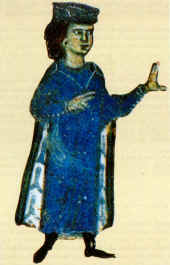William IX, Duke of Aquitaine
| William IX | |
|---|---|
| Duke of Aquitaine | |

Miniature of William from a 13th-century chansonnier now in the Bibliothèque nationale de France
|
|
| Spouse(s) |
Ermengarde of Anjou Philippa of Toulouse |
| Issue | |
| Noble family | Poitiers |
| Father | William VIII of Aquitaine |
| Mother | Hildegarde of Burgundy |
| Born | 22 October 1071 |
| Died | 10 February 1127 (aged 55) |
William IX (Occitan: Guilhèm de Peitieus; Guilhem de Poitou French: Guillaume de Poitiers,) (22 October 1071 – 10 February 1127), called the Troubador, was the Duke of Aquitaine and Gascony and Count of Poitou (as William VII) between 1086 and his death. He was also one of the leaders of the Crusade of 1101. Though his political and military achievements have a certain historical importance, he is best known as the earliest troubadour — a vernacular lyric poet in the Occitan language — whose work survived.
William was the son of William VIII of Aquitaine by his third wife, Hildegarde of Burgundy. His birth was a cause of great celebration at the Aquitanian court, but the Church at first considered him illegitimate because of his father's earlier divorces and his parents' consanguinity. This obliged his father to make a pilgrimage to Rome soon after his birth to seek Papal approval of his third marriage and the young William's legitimacy.
William inherited the duchy at the age of fifteen upon the death of his father. It has been generally believed that he was first married in 1088, at age sixteen, to Ermengarde, daughter of Fulk IV of Anjou. Biographers have described Ermengarde as beautiful and well-educated, though suffering from severe mood swings. However, Ruth Harvey's 1993 critical investigation shows the assumption of William's marriage to Ermengarde to be based largely on an error in a nineteenth-century secondary source and it is highly likely that Philippa of Toulouse was William's only wife.
...
Wikipedia
